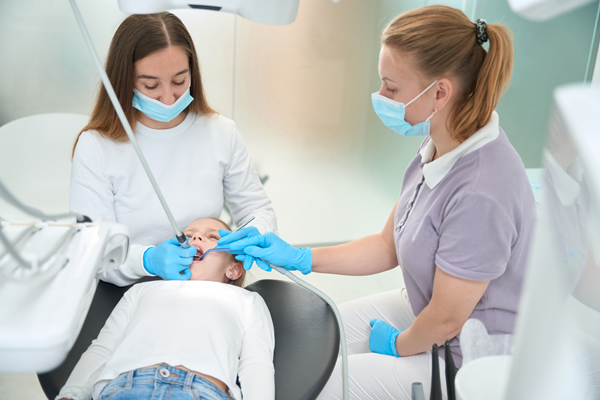When and Why Your Child Might Need Kids Dental Crown

Kids dental crowns are restorations used to prevent baby teeth from falling out before they are supposed to. Baby teeth hold space for permanent teeth, ensuring proper dental development and jaw alignment. While some parents may wonder why a pediatric dentist would not simply pull damaged teeth, kids' dental crowns protect affected baby teeth from further damage until the permanent teeth come in.
An overview of kids dental crowns
A kids dental crown is a small cap that is placed over a baby tooth to restore its shape, size, strength, and appearance and prevent further damage and complications. The crown is attached to the top of the tooth. When the tooth eventually falls out, the crown and the entire tooth will come out together.
Crowns are commonly made from stainless steel, porcelain, resin, or ceramic. Pediatric dentists often recommend stainless steel crowns due to their durability and cost-effectiveness. However, each type of crown has pros and cons, so its placement, allergies, and aesthetics typically determine the type recommended for kids' dental crowns.
When a child may need a kid's dental crown
Several situations may require the use of a kids' dental crown. These situations may include:
Severe tooth decay
A kids' dental crown might be necessary if a child's tooth is extensively decayed and a filling is not enough to repair it. Severe decay can weaken a tooth, making it prone to fractures and infection. A crown provides a strong cover, protecting the tooth from further damage and decay.
Broken or fractured teeth
Children are prone to accidents and injuries, whether they play a contact sport or experience facial trauma. If a child has a broken or fractured tooth, a kid's dental crown can help restore the baby tooth's function and appearance. It is crucial to address these issues promptly to avoid complications, such as teeth misalignment and infection.
After a root canal
If a child undergoes a baby root canal, also known as a pulpotomy, the tooth might become fragile or brittle. A kid's dental crown can protect the treated tooth and ensure it remains healthy and functional. Although baby root canals are less common in children, they are sometimes necessary to preserve the primary tooth until it naturally falls out.
Congenital dental abnormalities
Some children are born with congenital dental abnormalities that affect the structure and strength of their teeth, making them more susceptible to damage and decay. These anomalies may include weak enamel or irregular tooth shape. In these cases, crowns can enhance the tooth's appearance and function, allowing the child to chew properly and maintain a healthy smile.
Reasons to choose a kid's dental crown for your child
Kids dental crowns offer several benefits for restoring and protecting damaged baby teeth. These advantages include the following:
- Strength and durability. Kids dental crowns are made from strong materials, such as stainless steel or ceramic, which can withstand the pressures of everyday chewing and biting forces.
- Protection from further damage. A kid's dental crown protects it from further damage. This is particularly important for children with poor oral hygiene or those prone to dental injuries.
- Restoring function. A damaged or decayed tooth can make it difficult for a child to chew properly. A kid's dental crown restores the tooth's function, which allows the child to eat a balanced diet without discomfort or difficulty.
- Aesthetic improvement. In addition to functional benefits, kids' dental crowns can improve the appearance of a child's teeth. Crowns are made to match the color and shape of the surrounding teeth, giving the child a natural-looking and healthy smile.
The process of getting a kid's dental crown
Understanding the process of getting a kid's dental crown can help alleviate any anxiety the parent or their child might have about the procedure. During the initial examination, the pediatric dentist will first examine the child's tooth to determine the extent of the damage or decay. They may take X-rays to get a clearer picture of the condition of the tooth and the surrounding bone tissue.
If the tooth is severely decayed, the dentist will remove the decayed portion and clean the affected area. If the child needs a pulpotomy, the dentist will will perform it at this stage in the process. They can then shape the tooth so the crown will fit it properly.
If a stainless steel crown is used, it is often pre-made and can be placed in a single visit. For other types of crowns, the dentist will take an impression or mold of the child's tooth to fabricate the custom crown in an off-site dental lab. While the permanent crown is being made, the dentist will likely place a temporary crown over the prepared tooth to protect it.
Once the permanent crown is ready, it will be cemented in place, ensuring a secure fit for everyday function. The dentist will provide parents with instructions on how to care for their child's new crown at home, such as oral hygiene habits and dietary restrictions. Additionally, regular check-ups allow the dentist to monitor the crown and address any potential issues in their early stages.
Call our office to schedule a consultation
A kid's dental crown is an effective solution for restoring and protecting damaged teeth in children. Do you have further questions or concerns about the process? Call our Middletown office to learn more or to schedule a consultation.
Request an appointment here: https://www.hvkidsmiles.com or call Hudson Valley Pediatric Dentistry at (845) 363-4177 for an appointment in our Middletown office.
Check out what others are saying about our dental services on Yelp: Dental Crowns and Dental Bridges in Middletown, NY.
Recent Posts
While commonly associated with adults, dental crowns play a significant role in pediatric dentistry, so here, we explain the various aspects of kids dental crowns, including their purpose, recommendations, types, and placement process.Kids dental crowns can help parents protect their child's oral health and development. Here is everything that parents should know about when kids…
Pediatric dentistry is a field that deals specifically with the care of infants, children’s, and teenagers' teeth. More often than not, children experience a need for stainless-steel dental crowns. These crowns are most commonly used in pediatric dentistry due to their durability. When a child has badly decayed teeth, they should be seen by a…
The idea of a baby dental crown may spark fear in parents. However, rest assured that the procedure is straightforward and efficient. Modern-day dentistry has evolved quite a bit, and the dental specialist or pediatric dentist that performs this procedure undergoes extensive training to ensure perfection during and after the procedure is complete.When parents are…
If your dentist has recommended a baby dental crown for your child, you probably have questions about the procedure. A dental crown helps protect your child’s primary tooth from further damage and is often suggested when a tooth cannot be repaired with a dental filling. Here are frequently asked questions about baby dental crowns.A dental…


